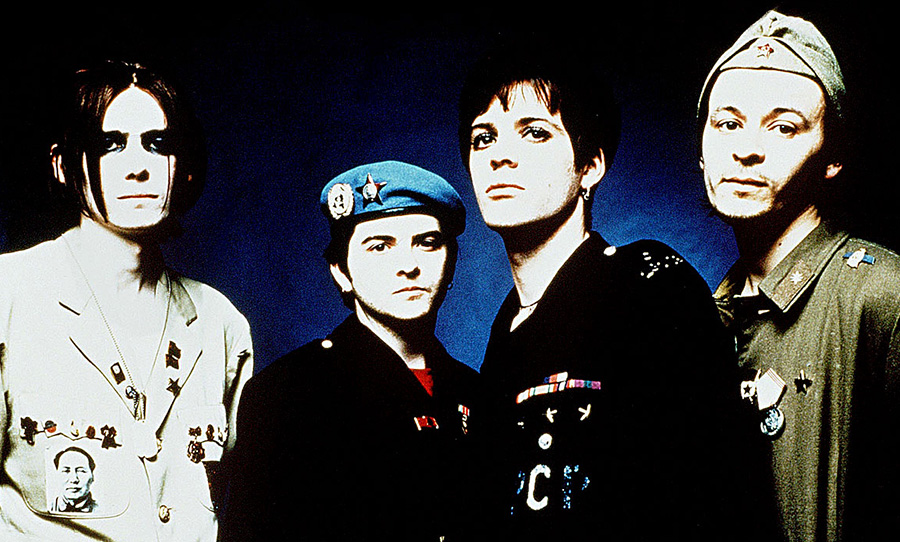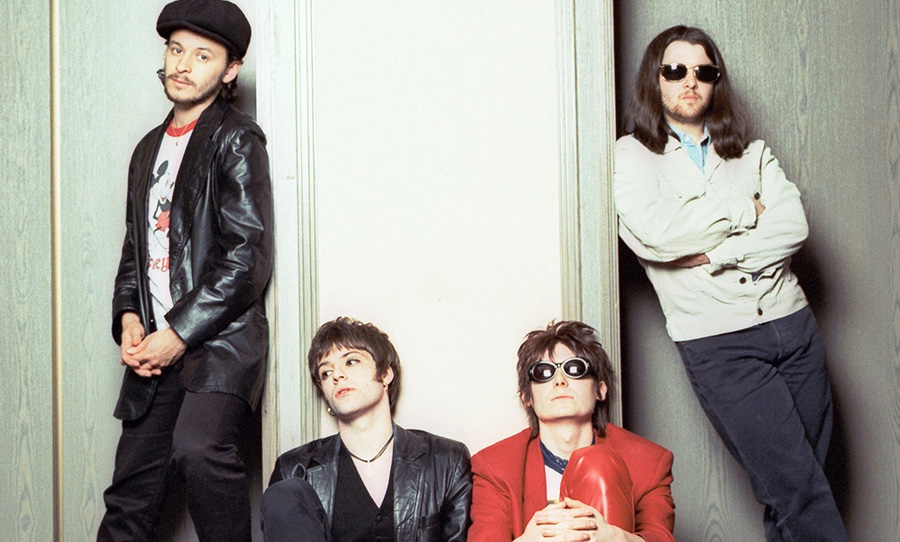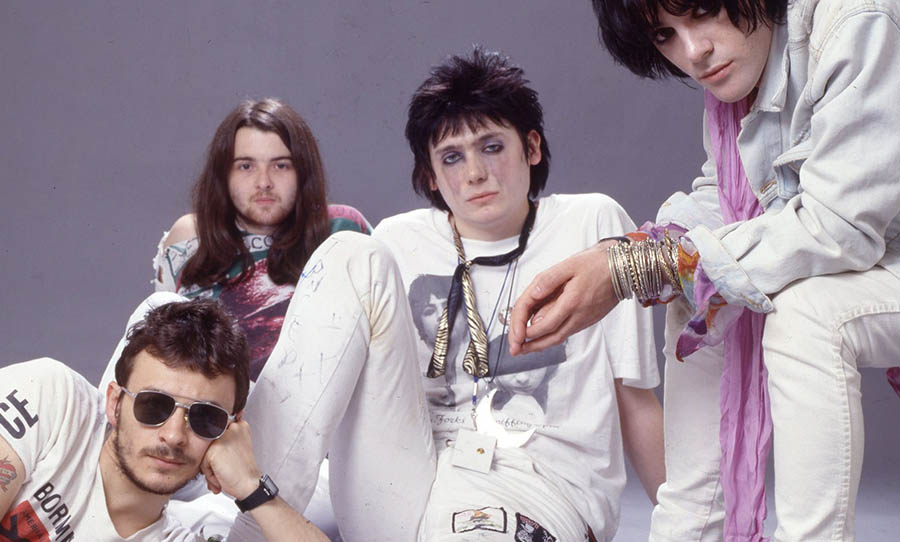The Holy Bible from Manic Street Preachers is a document of pure truths, showing us our world’s horrors and failings in their most confronting form.
CONTENT WARNING: This article discusses self-harm, substance abuse, and eating disorders.
Have you seen darkness? Do you know what it looks like? Elliott Smith’s tortured soul, Kurt Cobain’s investigations into his own psyche, Ian Curtis’ lyrical journeys into his loss of control; these are artists who tried to understand their own confused place in this world through their dissections of depression and illness.
However, it was the Welsh band Manic Street Preachers who may have produced the single most harrowing and twisted album about the disturbed, manic elements of our reality and society.

The band’s third record, The Holy Bible, challenged every norm in rock music of the time. Stripping back the instrumentation to the most industrial and purified forms of hard rock and punk, the band was creating a space of machinery for the lyrics to ‘shine’, if that’s how you would like to describe them. The lyrics on this record may are amongst the most impressive shows of poetic truth in all popular music. Masterfully curated and structured, we are invited into hell and left to boil and stew in our own flame.
To quote the great J.G. Ballard, “I wanted to rub the human face in its own vomit. I wanted to force it to look in the mirror”, a line is so prescient to the album that it was even used in the song Mausoleum.
The Holy Bible is one of the few albums in history which has forced humanity to look at itself long and hard before screaming at what they see; the truth and all its defects. All of this eventually led to their chief lyricist Richey Edwards’ own spiral, and the band having to crawl its way back into the world.
The Manics have been unfairly treated when looking back at their place in the pantheon of music. They are a band who has maintained consistent success even up until their most recent album Resistance Is Futile. They have had innumerable top 40 singles, all of which are collected on their spectacular collection National Treasures. Each single this band releases feels refreshing, tuneful, new, real, and different. They were masters of getting their message into the mainstream without the greater public being conscious that they were being told to revolt against the upper classes and fascism. However, the band somehow doesn’t seem to be mentioned in the same vein as their peers at the time. Although completely disparate from Oasis and the Britpop tirade, Manic Street Preachers are rarely appreciated in the same manner.
Taking pages out of their heroes’ books, The Manics tried to get their political messages onto mainstream radio much like The Clash. However it was their use of sheer noise and power, more consistent with Nirvana or Guns N’ Roses, that set them apart from your average political punk group. They wanted to be biggest band on the planet.
At the beginning of the band’s career, they were being touted as the new saviours of British rock way back when ‘the next big thing’ was controlled by the likes of Melody Maker and NME. Their groundbreaking 1991 single Motown Junk was fast paced, youthful, and revolutionary. Sampling Public Enemy on a punk-glam-metal mashup was shocking for anyone and everyone in the musical press at the time. The hype would continue well into the band’s press coverage for their debut album.
Much like The Stone Roses before them, the Manic Street Preachers didn’t disdain their new position as rock and roll saviours, they relished it. The band would make claims, and these aren’t exaggerations, that their debut album would be, “the greatest rock album ever, selling 16 million copies from Bangkok to Senegal”, and then the band would split up. Surprisingly, the album and the band did none of the above.
The album, Generation Terrorist, was critically acclaimed and produced six successful singles, but didn’t sell anywhere near 16 million albums. The record itself hasn’t aged quite as well as most of the band’s discography. Very much entrenched in the time and place of its release, the album shoots for London Calling levels of political consciousness (along with its stupendous 73-minute run time), but ends up coming off as a fantastic collection of glam metal/British hard rock hybrids. This wasn’t necessarily a tasteless cocktail, but it didn’t create the waves the band was obviously praying for.
An important point to mention at this point in time is the band’s imagery. If their comments and music didn’t tell you that they wanted to be the greatest and most important band on the planet, then their press shots sure did. They posed like nothing else mattered, they pouted, they wore army regalia, they wanted you to know that they were nothing to fuck with – but goddamn did they look cool. From their sheer, androgynous looks and a spectacular forcefulness of imagery, if a band like this came out today I would dedicate my life to following them.

A lot of this comes down to rhythm guitarist Richey Edwards, originally brought in as a backup to lead singer James Dean Bradfield to fill out the band’s massive sound. Soon enough Edwards would be constructing the band’s image and album artwork, not to mention co-writing the majority of their lyrics with bassist Nicky Wire. The band’s debut album was defined by its political commentary, often pushed by Wire. However its imagery was all Edwards. The now-classic cover of Edwards’ torso wearing a cross is still spectacular. His ideas and concepts defined the way the band was seen.
Following a difficult second album, Gold Against the Soul, which was seen as too much of a push for mainstream hard rock, The Manics decided they had to create a defining statement. Drummer Sean Moore stated the previous album had meant the band was, “going a bit astray”, and so they decided to rediscover “a little bit of Britishness that we lacked”. Moving away from their American influences, the band began listening to classic post-punk records by the likes of Magazine, Wire, and Joy Division.
Four weeks of recording meant straining the band’s personal relationships with the outside world. Each member suffered personal problems that were twisting their musical suggestions into raw, purified art. None more so than Edwards. Where most of the band’s previous lyrics were written in a 50/50 split between Wire and Edwards, the latter began to take the reins on their new stylings. Reflecting the return to punk aesthetics, Edwards began writing more personal manifestos, often reflected in his own physical and mental collapse. He would end up writing more than 70 percent of the lyrics on the new record
Edwards had famously written 4REAL into his arm with a razor blade during an interview with NME, however these gestures were only just covering up what was truly happening below the surface. As the band’s popularity grew, Edwards fell into alcohol abuse and became impossible to work with in the studio. As the band recorded their upcoming record, he would often show up drunk or begin drinking as soon as he arrived. Bradfield explained, “the day would start with a ‘schhht!’; the sound of a can opening.”
The new album’s raw sound was only made darker through its lyrics and imagery. The record’s front cover by Jenny Saville titled Strategy (South Face/Front Face/North Face), is only a small window into the personal horror laid out within. Saville gave the band full permission to use her artwork on the cover for free after Edwards went to the effort to explain the entire album’s lyrical content. It is this element of the record which really defines its power.
This is no ordinary lyrical journey. This is hell. This is truth. This is purity. This is rubbing your face in the filth and reality we try to hide from every day. The album’s title, chosen by Edwards, was used in order to reflect the album’s perfection. Edwards himself explained, which has in its own right become the best among manic street preachers quotes “The way religions choose to speak their truth to the public has always been to beat them down… I think that if a Holy Bible is true, it should be about the way the world is and that’s what I think my lyrics are about. The album doesn’t pretend things don’t exist.”
Just looking over song titles gives you a vague idea of what you’re about to experience. Of Walking Abortion, She Is Suffering, Die in the Summertime, The Intense Humming of Evil; this was never going to be balloons and ribbons. Challenging topics such as the Holocaust, starving oneself, suicide, American capitalism, murder, The Holy Bible was a complete package of horror.
The musical content is fast paced and aggressive, mechanical, terrifying and punchy, manic and gruesome. Songs like Ifwhiteamericatoldthetruthforonedayit’sworldwouldfallapart and Archives of Pain use the raw power of rock music – throbbing bassline, pounding drums, and squealing guitar – in order to reflect the even heavier lyrics. The latter track includes lines such as, “Don’t be ashamed to slaughter, persona of humanity is cruelty”, while the former includes the anti-capitalist truth,“There ain’t no black in the Union Jack/There ain’t enough white in the Stars and Stripes”, pointing a terrifying finger at America’s ‘free country’ belief system.
Edwards’ lyrics only go further down. Of Walking Abortion features the line, “Little people in little houses/like maggots small blind and worthless/The massacred innocent blood stains us all.” Die in the Summertime ends with the simple yet terrifying line, “I wanna die”. Possibly the most shocking and powerful song on the album is 4st 7lb, named for the weight in which death is unavoidable for people who suffer from anorexia. Edwards himself suffered the eating disorder, dropping down to 38 kilograms just after the release of The Holy Bible.
The song details his own personal experience with the disorder. Some of the lines are too graphic to write here. To use the song’s incomparable chorus, “I wanna walk in the snow/and not leave a footprint/I wanna walk in the snow/and not soil its purity.” This is not an album to listen to if you don’t want to deal with the most personal and shocking elements of our world while vicariously living through Edwards’ own turmoil.
The Holy Bible is connected by radio or dialogue snippets from throughout history, helping to bring together the record as a whole. Pickings samples from serial killer victims through to movie quotes and radio snippets about Margaret Thatcher, reality itself becomes the connecting tissue pulling these horrors together.
Following the record’s release in 1994, the Manic Street Preachers didn’t quite achieve the commercial success they hoped to have with their defining text. The album, however, was critically acclaimed and has slowly become one of the most well-regarded documents of personal suffering in British music. The British press praised the album, ranging from, “The Holy Bible isn’t elegant, but it is bloody effective”, through to, “the sound of a group in extremis, hurtling towards a private armageddon”.
The promotion for the record only added to the music’s shock factor. Decked out in army uniforms and camo sets, the band would often blast through their new collection of songs like a flurry of missiles aimed at anybody and everybody in the way. This all came to a peak during the band’s performance of the fantastic and brilliant album single Faster on Top of the Pops. The band, all wearing army uniform, playing a hardcore punk track on a popular music show wasn’t the main issue with the performance. The problems came when frontman James Dean Bradfield decided to wear an IRA-style balaclava during the performance. This lead to over 25,000 complaints, the most in the show’s long history.
Problems continued as the lyrical content started to become reality. Edwards was falling apart before everyone’s eyes. He was hospitalised following the album’s release due to drinking and self-harm, after which he rejoined the band to promote the release. The rest of the band, thinking he had begun to grapple with his inner demons, soon became worried again that Edwards was falling apart at the beginning of 1995.
On February 1st 1995, Edwards disappeared. His car was found near the Severn Bridge in Bristol, but his body has never been discovered. It wasn’t until 2008 that Edwards was made legally dead. This finality to the record gives it a near-complete circle feel; a terrifying document of descent that ends in the most heart wrenching of conclusions.
The band would continue into the future as a three piece. They would achieve number one singles, number one albums, Brit Award winning glory, and further critical acclaim. They would produce fantastic records such as This Is My Truth Tell Me Yours, Everything Must Go, and late career brilliance with Postcards From a Young Man, all of which would feature perfect melodies and ever-insightful lyrics. One-off singles such as the band’s number one Masses Against the Classes are perfect gems of gorgeous, hard rock revolt. However, through it all, The Holy Bible stands tall as a textbook of personal anguish; an album of battle-ready music, willing to do anything to get its message across.
The Manics deserve far more praise for their brilliance than they seem to get. I may prefer to listen to their record This Is My Truth Tell Me Yours, my favourite songs may be from a later period in the band’s career, but no other Manic Street Preachers album makes me feel this real.
If anything, The Holy Bible is pure. It’s a rebirth of the album as a document to fight for what is held within, no matter how bleak or horrifying those truths may be. I will happily argue that this is one of the most important, powerful, shocking and impressive records released, period. The Manic Street Preachers achieved something that is so rare in popular music; they achieved perfection, in all its grotesque and awful glory. It isn’t the kind of perfection you may normally associate with the word, it was perfection because it was human.
To use T.S. Eliot’s quote from his poem The Wasteland, “I will show you fear in a handful of dust”. The Holy Bible destroyed its main creator, but his final document was his own personal sacred text. This was Richey Edwards’ manifesto, and we can only learn from what he has taught us. We must continue to fight for the truth to be heard in our twisted world, even if it tears us apart.



